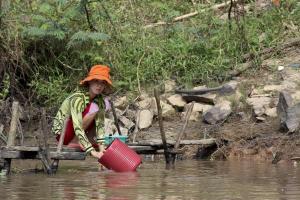By Adar Laia Thau
More than 3 billion people depend on marine and coastal biodiversity for their livelihoods, according to the U.N. Coastal landscapes and communities, however, are increasingly threatened by environmental degradation, climate change and overexploitation. Some experts believe meeting this ecological and economic challenge is contingent on creating connections between modern science and Indigenous knowledge.On Feb. 9, specialists on coastal socio-ecological systems convened at the 2021 American Association for the Advancement of Science (AAAS) Annual Meeting to discuss the relationship between coastal communities and environments.
Coastal communities are dynamic spaces, requiring highly localized knowledge to mitigate negative outcomes, such as overfishing and habitat degradation. Indigenous populations have maintained waterways and ocean systems for generations, developing localized methods and gathering information that is ultimately vital to the interests of coastal management. Nevertheless, Indigenous knowledge of these systems is rapidly eroding and remains largely neglected in research and environmental management, according to conservation surveys.
Elisa Morgera, director of the Global Challenges Research Fund (GCRF) One Ocean Hub, said this issue involves recognizing prejudice and misconceptions about Indigenous knowledge. Stakeholders must build capacity for understanding and ask how local perspectives may contribute to research and become better acknowledged by the scientific community.
“Not all scientists coming from different disciplines are equally prepared to understand and engage with Indigenous and local knowledge holders,” said Morgera. “I think the social sciences are much more advanced in that sense. And in a way, we're relying on them to build the capacity for other researchers.”
Despite increasing recognition of Indigenous cultures, regulations and systems to integrate Indigenous knowledge in decision-making processes range from lacking to non-existent. Morgera said scenario planning, marine spatial planning and other mapping techniques are “not yet fit for respectfully and appropriately integrating Indigenous and local knowledge, so there's work to be done.”
Inclusion of Indigenous and local knowledge has the potential to broadly change environmental management outcomes and drive research questions. River deltas, for example, comprise less than 1% of global landscapes yet support more than 500 million people, according to a recent Nature Communications analysis. These vital socio-ecological systems provide food, income, shelter and economic opportunity for surrounding communities.
“We need to … go back to Indigenous or local knowledge, look at the … coping mechanisms and the adaptive strategies that are already in existence,” said Andy Large, director of the GCRF Living Deltas Hub.
River deltas, like many other coastal landscapes, are multiple-use systems. They provide tangible and intangible benefits as they are nursery habitat for fish, natural shoreline protection and biodiversity hotspots.
“We need to be looking at both the natural capital as well as the social capital, ” said Dr. James Kairo, chief scientist of oceanography and hydrography at the Kenya Marine and Fisheries Research Institute.
Morgera, Large and Kairo are all exploring how to better include local communities in marine science by making culture more central to their research and science more accessible to the public. The One Ocean Hub developed a community-led approach using art to convey the richness of Indigenous knowledge and how it may complement modern science, as well as highlight the tensions involved in bringing these together.
Protecting coastal communities and ecosystem dynamics depends significantly on understanding, acknowledging and communicating the connectivity between people and place, while integrating local perspectives and historical knowledge into both science and policy.
“Culture is integral to sustainable development,” said Large. “Without an understanding and an appreciation of shifting baselines and how culture is being moved [and] replaced, … valuable lessons and learnings have been lost.”
Adar Laia Thau is a freelance writer and student in the Master of Arts in Science Writing program at Johns Hopkins University. Follow her on Twitter @AdarLaiaThau or email her at adar.thau@gmail.com.
This story was edited by NASW member Shelby Condit, who served as Thau's mentor during the NASW-AAAS Spring Virtual Mentoring Program.


